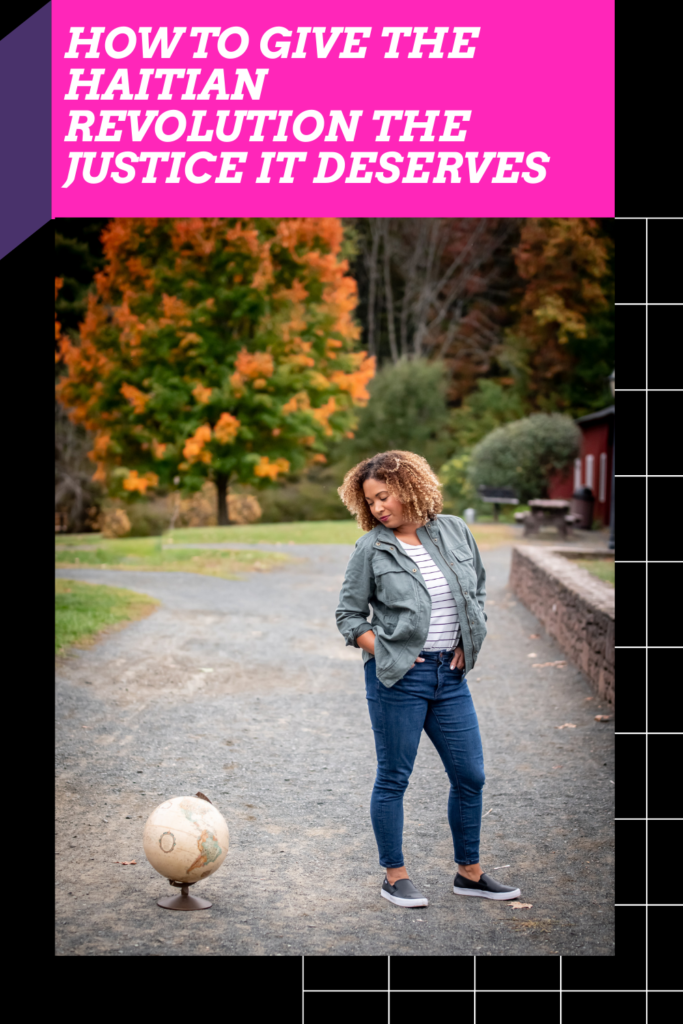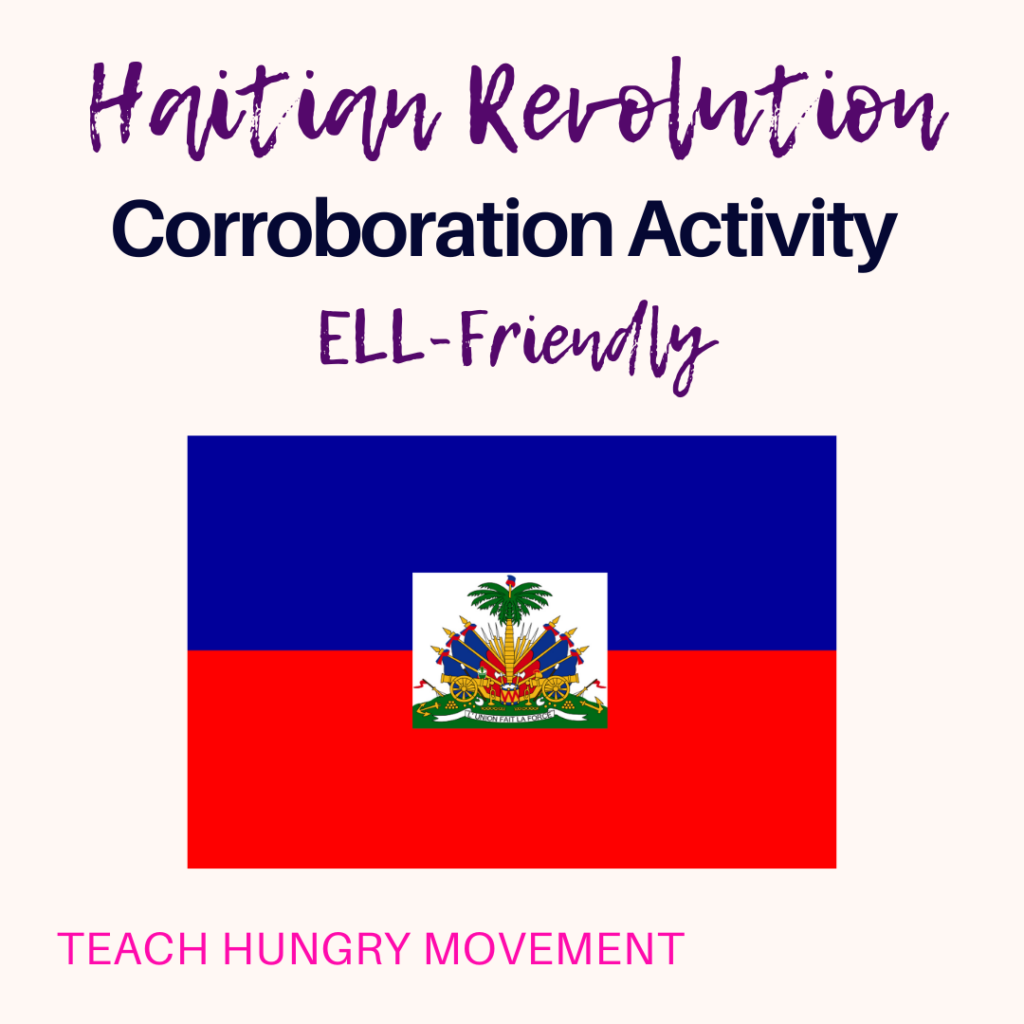The Haitian Revolution in 1804 is the most important revolution in human history. Yet, most people don’t know anything about it. (The defeated United States and European powers made sure of that).
Ok, you might be thinking, “That’s a bold statement, Noelle.”
It is and I stand by it.
The Haitian Revolution is so important because it’s the only successful rebellion of enslaved people in history. Also, it created the first Black republic. The enslaved people of Saint Domingue beat France, Spain, and the United States! So, why haven’t most people heard of it? We’ll get to that later.
I became interested in the Haitian Revolution when I was teaching in NYC.
I hadn’t learned about it in high school since the only World History requirement was World Civ. All I remember from that class was writing a paper on the Ancient Greek Olympics. I got a 98. And I took mainly U.S. History courses in college, thinking I’d be a U.S. History teacher. Jokes on me, I’ve taught World History most of my career.

On PD days, we were able to go to different museums throughout the city. (One of the few things I miss about teaching in NYC). One of my favorite programs was at the New York Historical Society. The focus was on the Haitian Revolution. They had an entire exhibit dedicated to Haitian Revolution leaders. As well as the causes and timeline of the Haitian Revolution. It was fascinating and I couldn’t wait to start teaching about it.
I went to my classroom to check the textbook, and boom. Less than one page about the Haitian Revolution.
Even the textbook I use at my current school has FIVE SMALL PARAGRAPHS.
The French Revolution gets an entire chapter. 25 pages. Hell, the American Revolution gets a section of a chapter. 5 pages. In a World History textbook.
You might be thinking, ok that’s that one textbook. Well, I also have a textbook that follows the Tennessee State Standards. In this textbook, there are FOUR paragraphs about the Haitian Revolution. The American Revolution gets five pages. And there are 20 pages about the French Revolution (not including Napoleon’s Empire).
Don’t get me started on how textbooks lump the Haitian Revolution in with other Latin American Independence Movements. They even conflate their social class systems. Saint Domingue’s social class system was very different from colonial Latin America’s.
This is a problem. Textbooks, even World History textbooks are Eurocentric.
I’m not saying that the French Revolution and the American Revolution aren’t important. They are.
But I argue that the Haitian Revolution is more important than both of them.
Why’s that? Well,
- It’s the only successful slave rebellion in modern history
- Haiti became the first Black republic
- Haitian revolutionaries defeated Britain, Spain, and France. Seriously?! An enslaved population defeated the three world superpowers at the time. Incredible.
- Americans feared that the Haitian Revolution would inspire rebellion in the United States. So much so that they banned white people from Saint Domingue from coming to the United States.
- Haitian Revolutionaires helped Latin Americans in their own revolutions. Hell, Simón Bolivar got direct help from the Haitian Revolutionaries.
- Haiti was the first country to outlaw discrimination based on skin color in 1798. The U.S. didn’t do that until 1964!
And many more reasons.
Again, the French and American Revolutions are important. I’m not saying we need to stop teaching them or that they don’t deserve space in a textbook.
I’m saying that as social justice educators, we need to find where we can tell a more well-rounded history.
After the Haitian victory, the U.S. and Europe made a concerted effort to impoverish Haitians. The United States refused to recognize Haitian Independence for 60 years.
Did you know the U.S. occupied Haiti in from 1915-1934? No? Me neither.

So how can we give the Haitian Revolution to justice it deserves? Here are several resources and ideas to help you get started:
1. Layout a strong foundation with a summary of the Haitian Revolution
I often do this with notes. I don’t give a ton of notes, especially in my standard level classes. But notes are an easy and quick way to give students a lot of information before moving on to the activities.
Now, I get it. Notes aren’t the best form of teaching. However, there is a place for them. Also, if we’re trying to get them ready for college and a career, we need to strengthen their listening skills. Notes do that.
Important topics to include are:
- Spanish/French conquest of Hispaniola
- The social class system of Saint Domingue. (It was different than other places in Latin America). And how the different classes interacted with each other.
- Slavery. What it was like and its impact
- Leaders of the Haitian Revolution. Not just Toussaint L’Ouverture. Other important people to talk about are:
- François Makandal
- Vincent Ogé
- Dutty Boukman
- Cécile Fatiman,
- and of course, my favorite, Jean-Jacques Dessalines.
2. Documentaries about the Haitian Revolution
There are two documentaries that I love for teaching the Haitian Revolution.
Granted, they are both pretty dry. I keep hoping that the History Channel will make a Haitian Revolution documentary á la World Wars or Men Who Built America. But, I won’t hold my breath.
Both documentaries are informative and great. I’ve used one of them in class and the other I used for my own educational purposes.
Égalité For All, is the most well-known documentary about the Haitian Revolution. It’s an old PBS jam, so like I said, it’s dry. Also, there are no subtitles, if you use the DVD. And it has those crappy, useless Youtube subtitles if you’re watching it there.
Anyway, it does a good job of describing the conditions in Saint Domingue. My main gripe about it is that it focuses on Toussaint L’Ouverture. Which is fine. But I want to tell a more well-rounded story.
The other documentary I found is called 1804: the Hidden History of Haiti. You can get it on Amazon. This one knocked my socks off. I watched it one evening when my husband was at work. I had my wine and notebook in hand. Every few minutes, I was texting my PLC to tell them the reckless sh*t I learned. I mean, I thought I knew a lot about the Haitian Revolution. Guess, I was wrong.
I highly recommend this documentary, even if it’s for your knowledge. I ended up adding a lot of what I learned from it into the notes I created for the kids.
3. Other videos and video clips about the Haitian Revolution
Like I said earlier, I usually don’t do many notes. I focus on group activities, video clips, map analysis, etc.
One of my favorite ways to start the conversation is by watching a video clip from Vice. It’s called The Haitian Money Pit. It focuses on current issues in Haiti. Particularly the ramifications of the earthquake in 2010. I know, that seems old, but a lot of the issues brought up in the video are still relevant today. And it’s engaging for students.
Another clip I’ve used in the past is good ol’ Crash Course World History. I don’t show it in class because John Green talks way too fast for most of my students. (Thank goodness he’s slowed down in his European History series).
I’ve given it to my honors students as homework and I’ve used it to give myself background information. It has its weaknesses, as any video that’s less than 15 minutes would have. But it’s a good launching point.
4. My favorite reading strategy for teaching about the Haitian Revolution
I love reading strategies from Reading Like A Historian. I usually focus on contextualization, especially if we’re doing some SAT practice.
But, when I teach the Haitian Revolution, I like to focus on corroboration.
One of my favorite resources for learning these strategies is the Teaching Channel. It’s free to join and they have videos to show you how to use the strategies. You find the video about corroboration by signing up. Then typing “corroboration” in the search bar. It will be the first option that comes up.
I used the strategy to create my activity about the Haitian Revolution. First, I have the students work with a partner to compare and contrast excerpts from two textbooks. Then I have the students corroborate six different documents. (There are seven, but we do the first one together). Also, the students complete the activity as a jigsaw. This helps with time management.
The objective is for the kids to answer the question: What is the real story of the Haitian Revolution?
There are a ton of questions you could ask the kids, but this is the one I focus on for this part of the mini-unit.
(Click the image below to grab my customizable Haitian Revolution Corroboration Activity).

5. Podcasts about the Haitian Revolution
I haven’t used podcasts in class yet, but I plan to give them a whirl. There are some great podcasts you can either use in your class or listen to for your own education.
One of my favorite podcast episodes about Haiti is from Behind the Bastards. Now, I wouldn’t play this one in class. There are way too many f-bombs and other inappropriate language. However, it’s a great listen for you. The episodes that deal with Haiti are Papa Doc and Baby Doc: Dictators of Haiti Part I & Part II. The first part talks a bit about the Haitian Revolution. The rest of the episodes discuss the aftermath of the Haitian Revolution and the reign of Papa Doc and Baby Doc.
A podcast series you could play for your students is from the podcast, Revolutions. (Though it’s pretty dense, so I’d listen to a short snippet of it). Mike Duncan dedicates an entire 8-episode season (season 4) to the Haitian Revolution. It’s worth a listen.
You can find both podcasts wherever you listen to podcasts.
Over the years, I’ve taught about the Haitian Revolution in many ways.
It depends on how the year is going and if I’m ahead or behind. But what’s most important is giving this topic justice. Many Haitian students told me that they appreciated learning about the Haitian Revolution.
As social justice educators, we need to bring the events that society has relegated to the sidelines to the forefront.
Don’t forget to grab the Haitian Revolution Corroboration Activity from my TPT store!
Did you like this post? Check out more at the Teach Hungry Movement!
Want my best tips & strategies? Join my list!
I can’t thank you enough for this! The Haitian Revolution is SO complex. I feel like I never do it the justice it deserves. I will definitely refer back to this next year when I teach it again.
Thank you, Grace! I’m glad I could help!
In case you and your readers find it helpful, my colleague and I have long taught a high-school interdisciplinary course on the literature and history of the Haitian Revolution. We made an interactive map and timeline of the revolution with teaching materials, and the site is now available in French, Spanish, and Kreyol too. https://www.mappinghaitianrevolution.com/
I love the idea with the jigsaw and the two textbook interpretations – any chance you could elaborate on this or indicate where you found your resources? We are trying to rework our scheme on Haiti to consider wider interpretations and significance